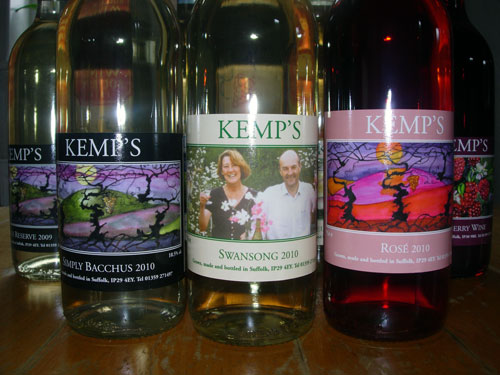After 26 years in the wine business, John Kemp retired at the end of last year. An extremely talented winemaker in Suffolk, he cites age (72 but looks considerably younger), a desire to do the things he wants for the rest of his life, like kayaking (!) and the rising cost of petrol affecting transportation costs as reasons for stopping. Previous owner of Giffords Hall, in Hartest near Bury St Edmunds, he decided to set up a small winery nearby in three acres of land, approximately nine years ago. Keeping his operation small, he decided to sell wine at country shows and through mail order only. John retires at a time when English wine is receiving an increasing number of accolades and the future is definitely wine-coloured, if not orange.
Although the focus of interest on English wine is very much within the southern counties, East Anglia also produces wines of good quality and John Kemp is a fine example of how far English wine and English producers have come over the past few decades. I first met John at the English Wine & Regional Food Festival in summer 2006, held in Alfriston. Buying a few bottles, including a bubbly, I took them home to enjoy at my leisure. The sparkling wine was 100% Bacchus and was a perfect example of varietal winemaking which I opened on New Years’ Eve. Dry, fruity and intensely aromatic, this was an unusual alternative to a more traditional sparkler and was enjoyed by all who had the opportunity to sample it – a true expression of the Bacchus grape variety. I arranged a private visit a couple of years later, when John very kindly took me around his vineyard and spoke about his years in publishing and then the wine business. One very bad year, when most of his grapes were ruined by the weather, almost led to bankruptcy, but fortunately the following year rescued him – a reminder that the vagaries of our climate do not favour the English and Welsh winemaking industry. John also told me how he started making country wines and liqueurs. I had already tried his raspberry wine, made from 100% raspberries fermented in a similar way to grape wines and I had found this completely different to my previous experiences of country wines. At only 10% alcohol, not cloyingly sweet, but light and fresh, it was a great summer drink served chilled. Apparently, John had not rated country wines at all, but after he decided to have a go at making some, he realised that they were not as bad as he thought – perhaps another testament to his winemaking abilities.
The principal grape varieties he grew were Bacchus, Rondo and Madeleine Angevine. The latter is a bit of a marmite grape – you either love it or hate it and I have spoken to English wine producers who loathe it ! However, it is perfectly suited to the English climate and grows well in the Suffolk sunshine. Dry and fruity with notes of elderflower and perfectly balanced acidity, John’s highly aromatic 2006 vintage was a well-made example of what this grape can achieve with good winemaking skill. Both Madeleine Angevine and Bacchus from East Anglia can offer a different expression of these grapes from other parts of the UK. Here, Bacchus can often show strong notes of gooseberries and elderflower and indeed this trend continues to be shown in Gifford Hall’s excellent Bacchus 2011. Nevertheless, out of all John Kemp’s wines, the pièce de resistance for me, which I have already written about in an earlier article, was his Rosé 2005, made from a blend of Rondo and Bacchus (let’s not argue about the supposed validity, or otherwise, of this method of making still rosé wine!). Light and fresh with hints of raspberry and a pear and vanilla creaminess on the palate, this once again demonstrates how good winemaking skill plus the choice and blend of grapes can contribute to a quality end product.
David Harvey, in his fascinating book “Grape Britain”, makes the valid point how the better quality wine tends to hail from vineyards planted on slopes. Camel Valley and Sharpham Estate are two of many examples which certainly support this statement, but what of East Anglia? This part of England is not exactly known for its Alpine topography, but given the right grapes and human skill, good winemaking is certainly achievable. John Kemp always managed to get the best out of his grapes and winemaking skill to produce extremely good value-for-money wines. “Terroir” may be important, but even in the absence of steeply sloping hillsides, the sunny vineyards of East Anglia should not be forgotten by those in search of quality English wine. Indeed, Essex’s New Hall Vineyards Bacchus 2011 has recently won the UKVA Berwick Trophy for best unchaptalised wine.
Some of Kemp’s wines and liqueurs are still available from DJ Wines, but the appropriately named “Swansong” from John’s final vintage in 2010 will probably not be. I do have one bottle at home and I know I’ll enjoy drinking it, hopefully on a warm English summer’s evening, if we ever get any sunshine without rain! Cheers!



Sad to see – I hope he has a good retirement.